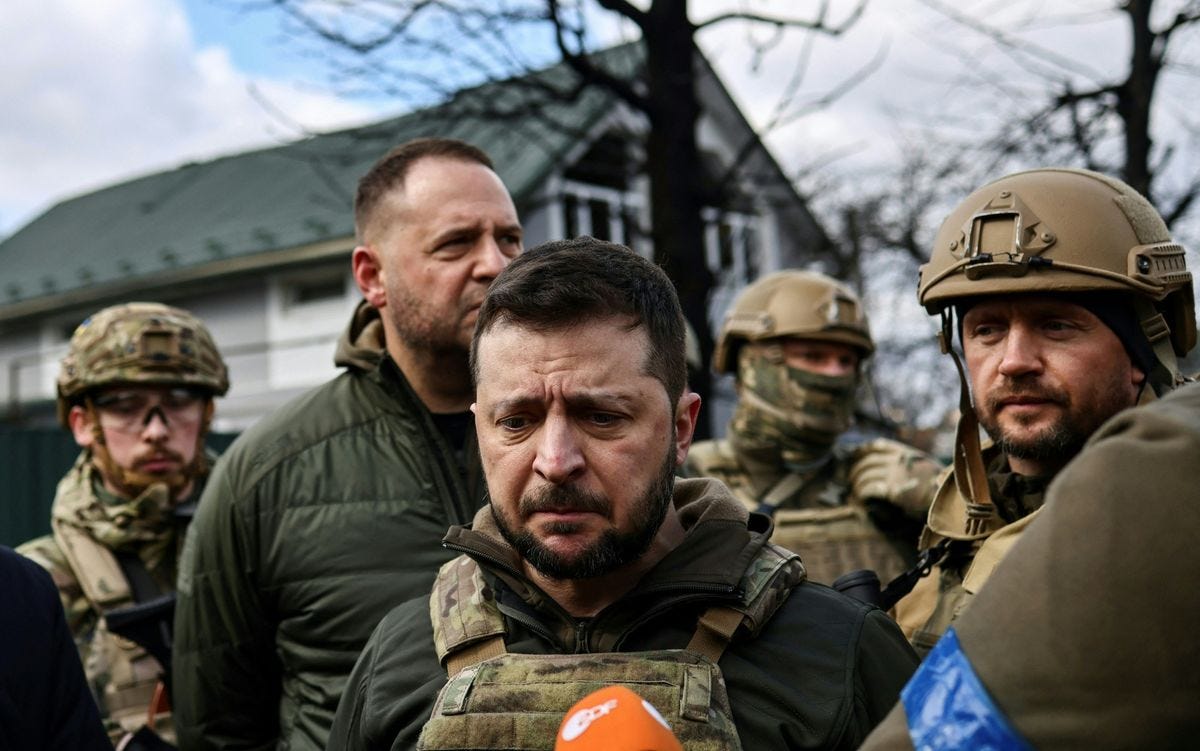Can we talk about Ukraine?
Hi everyone. I have been away from home for a while (catching up with family I hadn’t seen in a while), but I am home now and I’ve cleared my schedule through the rest of the year so that I don’t have anything to do except read, write, and talk to you. I have started saying no to things, because for at least the next several months I don’t want to work on anything except MartyrMade (history show and the Substack), Unraveling… and this other thing.
My friend Scott Horton asked me to co-author a book with him about the history of the war in Ukraine and the conflict between NATO and Russia since the end of the Cold War. Basically an expanded, heavily-footnoted, 40-page bibliography version of the Thoughts on Ukraine episode I did a few months ago. We really want to do this right, so I’m going to be spending a lot of time reading (and re-reading) material on the topic. Since the war in Ukraine is literally the most important thing in the world these days, and since it’s already stealing a lot of my attention even without the book, I figured I’d let the spirit take me, and report to you along the way. So, over the next few months, I will still be doing pieces on other topics (the big Hatfield-McCoy post/episode is still coming), but we’re going to spend some time deep-diving on the new Cold (and increasingly hot) War. Obviously, at the end of the day, I work for you guys, so if I’m going too heavy on the topic, feel free to let me know, but I think that over the next few months we’ll be getting into many interesting things you might not expect.
This first post is just to set the table.
In a video that made the rounds a few months ago, Oleksiy Arestovych, Special Adviser to Ukrainian President Volodymyr Zelenskyy, predicted the current war almost three years before it began. He explained to the interviewer that the Russians planned to reconstitute the Soviet Union, and refight the Cold War - a perspective that has become not only mainstream, but virtually (and, in the case of some European countries, literally) mandatory in 2022. The interviewer asked what could be done to prevent it, and Arestovych told her:
Only accession to NATO. If we do not join NATO, then we are finished. We do not have the strength to be neutral. We will not remain neutral. For some reason, naive people think that neutrality is when you can spend little on defense because we are not going to fight with anyone. Neutrality costs 10 times more than a war with someone else. Switzerland being a neutral country means that all the boys and girls serve in the military, crazy military taxes, and so on. Despite the fact that it is not surrounded by Russia, it is surrounded by France, Italy, Germany and Austria… We have 2,700 kilometers of land border with Russia, which is a bare steppe. Do you have any idea how much neutrality will cost us? And count the rest of the countries that have territorial claims against us. Therefore, we will not maintain neutrality, we will not have enough resources. Geographically, no country would be able to maintain neutrality in this position.
The last few sentences are very interesting. “And count the rest of the countries that have territorial claims against us.” After the First World War, the traditionally Polish and Catholic region of Galicia was integrated into the newly constituted Polish nation, and a situation erupted that carries resemblances to the current crisis in Ukraine. Just as many Russians suddenly found themselves in a foreign country (eastern Ukraine, in this case) after the fall of the USSR, and maintained mixed loyalty at best to the new Ukrainian state, in 1918 there were many ethnic Ukrainians living in Polish Galicia, including a strong nationalist element that wanted to be part of Ukraine. Just as the eastern part of Ukraine rebelled, with Russian assistance, against the Kiev government after the 2014 coup, Ukrainians in the eastern part of Galicia tried, with Soviet assistance, to break away from Poland in 1918. Ethnic Russians comprised approximately one-third of the population of Ukraine when the USSR was liquidated in 1991, and were seen by Ukrainian nationalists as a potential fifth column; ethnic Ukrainians comprised a significant part of the population of the new Polish Republic, and a majority in parts of their eastern homeland, and were seen by Polish nationalists as a potential fifth column. Both Poland in 1918 and Ukraine since at least 2004, and especially since 2014, took actions to suppress and intimidate the suspicious minority in the eastern part of the country.




